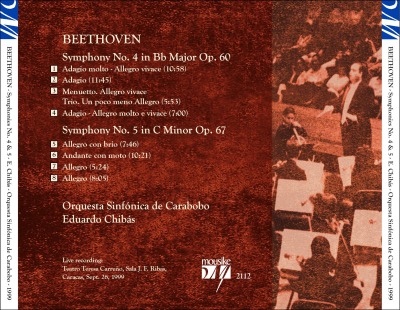 | Beethoven Symphonies 4 & 5 Carabobo Symphony Orchestra $9 | ||
These recordings come from a concert I conducted in 1999. I have always considered it one of my best, and although there are some wrong notes here and there, the intensity of this performance more than makes up for that, in my opinion.
The Fourth is a very unusual interpretation and I have never heard one quite like this. I feel that in this work, the music is in a straightjacket. Beethoven had very little time to compose it (the shortest composition time of all the symphonies) and decided to use a classical format. However, this was Beethoven's most creative period and he was overflowing with ideas. He poured them into this "old" format and it feels like it will burst at the seams. So I chose to highlight this issue by going against the format, dramatizing the music's struggle to break out of it. There is no Greek Maiden here. This I did in various ways, including a very aggressively accented First Movement, as well as slowing down considerably (some may say too much) for the transition to the Recapitulation. The Forth Movement has an enormous amount of energy, although this energy feels somewhat uncontrolled. In the Coda, the climax comes somewhat prematurely, not having Beethoven's normal build-up. I see this as a premature ejaculation. I attempt to express the embarrassment of this lack of control through the phrasing and tempi after this climax. In my view, this interpretation explains to some extent the very strange way this symphony ends.
The Fifth is a more standard interpretation conceptually, following the tragic/ecstatic idea usually associated with this work. Those who know Furtwängler's interpretations of the Fifth will see that those recordings have influenced me. It is interesting to contrast this interpretation of my own with the Venezuela Symphony Orchestra from 6 years later. The realization that our civilization's decadence was further along than I had thought, and that the democratic ideals I had held all my life were the instrument of that decadence, has made it more difficult to see ecstasy as a realistic outcome of what I do. By the time of the second recording of the Fifth, I felt that it was more appropriate to emphasize an affirmation of humanity. Curiously, the "contour" of both interpretations sound very similar, but the underlying emotions and concepts are very different. It saddens me that I now know too much to be able to do an interpretation of this work like the one from 1999. It makes me value that one all the more.
 |